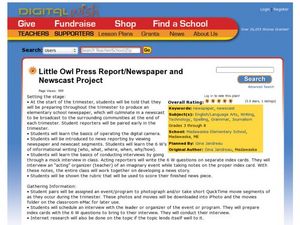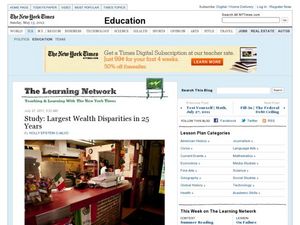PBS
Journalism in War Time: What Does the Public Need to Know?
A viewing of the documentary War Feels Like War, launches an exploration of the importance of accurate and comprehensive war reporting. Groups investigate various news agencies and assess the factors that influence their stories. A...
Global Oneness Project
Citizen Photojournalism
Matt Black's photo essay, "The Geography of Poverty" provides a shocking reminder of the poverty that exists in the United States. The resource not only focuses attention on poverty but also conditions that have given rise to situation...
The New York Times
'The Century's Bitterest Journalistic Failure'? Considering Times Coverage of the Holocaust
Rich with primary sources and additional resources, this plan asks class members to think critically about newspaper coverage of the Holocaust. Focusing in particular on the analysis of the article "150th Anniversary: 1851-2001: Turning...
Curated OER
Little Owl Press Report/Newspaper and Newscast Project
Discover journalistic techniques by having learners prepare and write their own class newspaper. They discuss the five W's of investigative journalism and conduct interviews with school figures. They utilize video technology, podcast...
Facing History and Ourselves
#IfTheyGunnedMeDown
As part of their continued investigation of the reporting of the shooting of Michael Brown class members analyze photos of Michael Brown and the social media response to these images. The class then develops a guide they...
Curated OER
What We Eat, Where We Sleep: Documenting Daily Life to Tell Stories
This is not just a New York Time article to read, this is a set of amazing activity ideas all related to the slide shows "Breaking Bread Everywhere" and "Where Children Sleep." Your class can view each show, read about what they mean...
Curated OER
Summing Up the Disaster
Learners are introduced to news writing being a concise, factual, and informative type of writing. They assess that publishing an article in a newspaper style utilizes a word processing program. Each student researches the Titanic and...
National Endowment for the Humanities
“Read All About It”: Primary Source Reading in “Chronicling America”
Can investigative journalism become too sensationalistic and accusatory, or is it vital for the survival of a democracy? Middle schoolers analyze primary source documents from early 20th-century newspapers as well as Theodore...
DocsTeach
WWI Propaganda and Art
Uncle Sam wants you! During World War II, the US government and military created a propaganda campaign to gain public support. The activity uses primary documents such as photos to explain how and why the propaganda campaign was...
Curated OER
Dangerous Roads in Your Community
Students collect information about dangerous streets and intersections in community, interview law enforcement officials and safety experts to find out what they think can be done to reduce accidents, write in-depth article using these...
Reporters Without Borders
2017 World Press Freedom Index
Freedom of the press was seen as a right so important that the Founding Fathers listed it as part of the first amendment to the United States Constitution. Americans pride themselves on this freedom, but just how free are American...
Curated OER
This Just in! Nile Network News Update
Have your young reporters research contributions of the ancient Egyptians, draft scripts, and broadcast their stories live on the Nile Network News. Depending on class size and age, topics may be brainstormed or assigned. The detailed...
Curated OER
Hacking Campaign, Seen as Linked to China's Arm, Targets US Industry and Government
This single link includes six New York Times articles for learners to read. Each article relates to the Chinese culture, government, school system, or economics in some way. Each also includes a set of comprehension questions for...
Curated OER
The U.S. War in Iraq Officially Ends
Examine issues and events surrounding US withdrawal of troops from the Iraq War. After reading this New York Times article learners respond to each of the nine who, what, when, where, and why questions.
Curated OER
School for Santas
Being able to read and recall is a very important skill. Why not have learners read about an American holiday phenomenon? They'll answer who, what, when, where, why, and how with regard to a New York Times article about a school for...
Curated OER
Fun, and Risks, at the Beach in Tel Aviv
After reading the article "Fun, and Risks, at the Beach in Tel Aviv," learners consider eight related questions. They'll answer who, what, when, where, why, and how about the risks several Palestinian women took as they snuck over the...
Curated OER
Study: Largest Wealth Disparities in 25 Years
The New York Times has produced an article specifically geared to its younger readers. They read an article entitled, "Largest Wealth Disparities in 25 Years" to answer six comprehension questions. They'll be asked who, what, where,...
Curated OER
The Coachella Festival
A New York Time article on a major music and arts event can be a good way to get kids interested in the daily news. They read an article about Coachella, and then answer eight comprehension questions, in either blog or print form. Note:...
Curated OER
Earthquake Strikes Virginia
In August of 2011 an earthquake shook the nation's capitol, and became a newsworthy event; learners read this New York Times article to find out why. They read the piece then answer nine related comprehension questions. Two additional...
Curated OER
Disposables and Deforestation
Ever think about the impact those cool disposable chopsticks have on the environment? Read about a group of students in Beijing who created a forest using nothing but tossed out chopsticks. Find out how this artistic endeavor is making a...
Curated OER
Preparing for Passover
Informational texts come in all shapes and sizes. Your kids will read the New York Times article, "Preparing for Passover" then answer seven comprehension questions. The answer to each question is located in embedded hyperlinks.
Curated OER
In Legal Limbo
Newspapers are great learning tools. They act as a conduit for current events, reading comprehension, and critical thinking. Here, pupils read a New York Times article regarding US immigration law under the Obama administration and...
Curated OER
Cute, Colored and Contentious
Whether your class responds to the blog linked to this article, or just answers the nine related questions, they're in for an eye-opening read. Pupils consider animal rights as they read a New York Times article about two men who have...
Curated OER
The World's Newest Nation
Reading comprehension can be fostered in many ways. Learners become informed as the read a New York Times article on the South Sudan, the world's newest nation. They read the article and then answer each of the 12 related questions.























